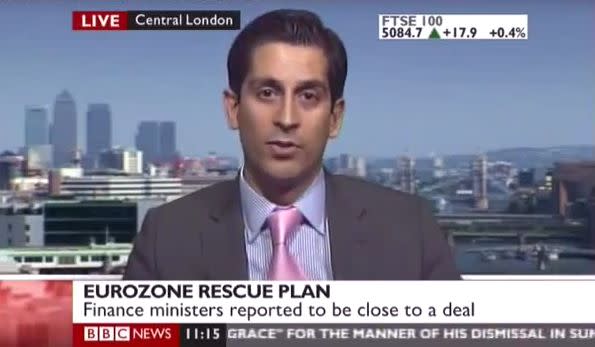 The Cutline
The CutlineWas the BBC victim of a hoax? No, say the Yes Men

"Governments don't rule the world, Goldman Sachs rules the world."
That's what a purported London-based independent trader named Alessio Rastani told the BBC on Monday in a jaw-dropping interview that quickly went viral.
But just as quickly, rumors swirled that Rastani was actually a member of the Yes Men, a loose-knit group of merry pranksters and imposters that attempt to manipulate the media with the goal of exposing the dubious conduct of big corporations.
The Yes Men publicly denied that Rastani is a member. And the BBC said in a statement that it doesn't think he is, either: "We've carried out detailed investigations and can't find any evidence to suggest that the interview with Alessio Rastani was a hoax. He is an independent market trader and one of a range of voices we've had on air to talk about the recession."
"We've never heard of Rastani," the group said in a statement of its own. "He isn't a Yes Man. He's a real trader who is, for one reason or another, being more honest than usual."
Rastani has an active Twitter feed, Facebook account and blog--all consistently updated. And Rastani gave an extensive interview to Forbes insisting he is who he says he is--an independent trader who works from his South London home.
Felix Salmon of Reuters has another theory: that Rastani, who bears a striking resemblance to a member of the Yes Men, is both a trader and member of the troupe.
"Independent traders are, well, independent," Salmon noted. "You don't need to spend very much time hanging around the comments section at Zero Hedge to discern a strong nihilistic and even anti-capitalist strain to much of the thinking in that community. Independent traders are often men in their 20s and 30s who inherited a substantial sum of money and who for whatever reason don't have a more attractive opportunity in the regular workforce. They work from home, they tend to have a strong contrarian streak, and they have a lot of time on their hands.
"All of which is entirely consistent with the profile of the kind of people who might join or become the Yes Men," Salmon added.
For his part, Rastani says he was simply misunderstood.
"I have no idea why I'm getting this attention," Rastani told Forbes. "I don't think it was news. For someone to say what I said, I thought everybody already knew this kind of stuff. The big players of funds rule the world, I don't think that was news. And what I said about making money from a crash, obviously not everybody knows about that, you can make money from a downward market."
Rastani added: "A lot of people just got the wrong end of the foot, misunderstood what I was saying. They thought I was joyful or licking my lips about the idea of making money from people's miseries. That's probably the way it looked on the video. But if they watch the whole video, what I was really trying to say is people need to educate themselves about how to do that ... what I was trying to say was, look, everyone should basically prepare. I was trying to be the good guy. If this market's going to crash, then you've got to prepare yourself."
